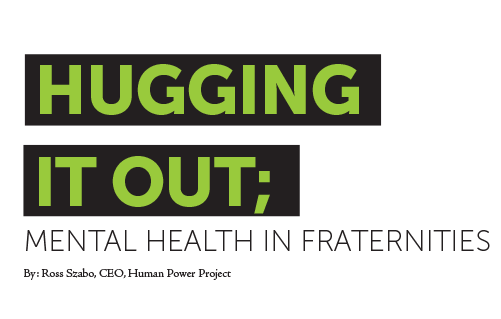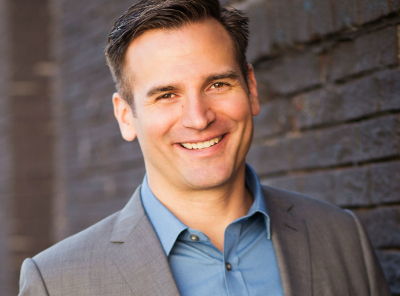Hugging It Out: Mental Health in Fraternities

I stared out of the window of the psychiatric ward in utter disbelief that my freshman year of college had ended after only two months. I went to American University with so much hope. College was going to be the place where I moved forward with my life. A setting where I could meet new people, make new friends, and finally get out of my small town. I was also hoping to no longer be haunted by my bipolar disorder that plagued me in high school. Unfortunately, the change to a new environment brought out the worst episodes I had ever seen.
After days of uncontrollable, mind racing thoughts, I binge drank to shut my brain down. Nights of heavy drinking eventually led to hopeless depression, thoughts of suicide, and extreme loneliness. Then the hallucinations surfaced. Slowly at first, with me just hearing my name, but the delusions built to assaulting voices telling me to hurt myself and others. Luckily, I had the awareness to call my parents and tell them I needed to come home.
They were used to getting calls about me. When I was a senior in high school, I was hospitalized for attempting to take my own life. At the time, I wasn’t on anyone’s radar. I was president of my class, a varsity basketball player, volunteering in multiple organizations and had a high GPA. On the outside I had everything going for me, but on the inside I was wrestling with an episode of clinical depression. I didn’t want to die, but I didn’t know another way to stop all of my thoughts about suicide, death and constantly obsessing over the possibilities of everyone I loved dying.
It took me six long years of different colleges, treatment plans and hard work before I was able to return to American University and finish my degree. Now, as I travel around the country, regularly speaking to fraternities, I look out at the thousands of brothers and let them know their chapter can be a great place to work on their mental health. It’s a time of growth and newness that offers some of the best opportunities to learn about oneself.
Mental health should be a part of brotherhood. When a brother breaks his leg, we all do what we can to support him, but when he has problems with anger, drinks a little too much or isn’t quite getting over that breakup, we don’t know what to do. Here are some reasons fraternities are in a good place to help brothers with their mental health.
- SUPPORT — Fundamental concerns for students who are dealing with mental health issues are isolation, not having consistent contact with anyone and no one being there to help them. Members of fraternities have built-in support. They have someone to check in on them, encourage them to go to classes and help them work through whatever difficulty they may be experiencing. Each chapter also has an adult advisor, and they are developing a protocol to follow when a member is showing signs of distress.
- CONNECTION — Being connected to something larger than yourself as you deal with any mental health challenge is really helpful. Greek life offers chances to volunteer and feel like you’re part of a community. That type of connection can make a huge difference when someone is in the depths of depression or working on other problems in their lives.
- SHARED VALUES — Students become members in individual fraternities because they like what that chapter offers. They want to enter into an organization with brothers who have shared interests and perspectives. The common ties of brotherhood or sisterhood should also matter when someone in the chapter isn’t doing well. Caring about members with mental health challenges should be an extension of what led someone to join his or her organization. Making this topic a priority in Greek life will save lives and enhance emotional development.
FINDING YOUR STARTING POINT
I regularly travel around the country and speak about my experiences with bipolar disorder, anger, depression and substance abuse. After decades of awareness, young men are engaged and want to alter how they deal with mental health. Also, studies show that men who are more socially connected are less likely to develop depression.
One night, I was speaking with 40 fraternity members about coping skills, what worked for me, and what they could do for each other. There was a lot of head nodding, but definitely some disconnect. Then it hit me.
They’re agreeing with me, but they don’t have a starting point. For years, they’ve heard about depression, suicide, anxiety and all of the other terms, but they’re not sure how it applies to them.
Having a starting point to begin to change any health issue is vital. If a guy wants to get in shape, he doesn’t buy running shoes and run a marathon. He starts by running a mile, advancing to 3 miles, then 5 miles, then 10, and on and on until after months of training, he can run that marathon.
Changing your mental health requires the same amount of work. All of it begins with knowing where you are right now and what you’d like to work on. To find your starting point answer these five questions:
WHAT DO I WANT TO CHANGE?
Most guys I talk to want to change the way they cope with something. That could include drinking, drugs, anger or not having the words to describe how they feel.
DO I KNOW HOW TO CHANGE THIS?
When we work on our physical health, we often look for help. Whether it’s checking out the best online core workout filled with burpees or copying what some other guy is doing at the gym. When it comes to your emotions, you might not know the next steps. Talking to a counselor, therapist or mental health professional can help. Having friends, family or a partner you can check in with makes a big difference.
HOW DID I GET HERE?
It’s good to think about your emotional timeline and what contributed to your mental health. Are there mental health issues in your family? How was coping modeled for you at home? How long have you been coping a certain way? All of those answers can help you see how you developed specific habits in your life.
HOW CAN I START TO CHANGE?
Set some achievable first steps for yourself. You need to train your mind like you would your body. Start with some small steps to make whatever you’re trying to change a little easier. When I wanted to address my anger control issues, I started by trying to recognize when my anger built. That took months. Then I was able to start finding ways to calm down before I flipped out.
WHAT IS MY END GOAL?
Think about what you want to be able to do in a year or two years from now. Check in with yourself along the way to see if you’re achieving what you want.
RESOURCES AND SUPPORT
Again, maintaining your mental health can draw a lot of parallels to maintaining your physical health. We should consistently take actions that are good for us, whether we are wanting to make changes or maintain good health.
More college students than ever are coming into school with a diagnosed mental health disorder. But even those who do not should still be knowledgeable about things like managing stress and anxiety, coping mechanisms, warning signs of depression, and how to help friends who are struggling. Campus counseling centers are phenomenal resources. Here, trained professionals can work with you on a number of issues confidentially and often for free.
The Jed Foundation has one of the best websites (www.jedfoundation.org) for finding mental health resources. JED’s goal is to equip teens and young adults with the skills and knowledge to help themselves and others in regard to mental health. The American Foundation for Suicide Prevention also has great resources when talking specifically about suicide.
As fraternity men, you have the unique opportunity to build a powerful support system for yourself and one another. Let’s make sure taking care of each other’s physical and mental health is part of our brotherhoods.
MENTAL HEALTH TIPS
1. CHANGE CAN BE A TRIGGER.
The first time you’re on your own, it can be a really freeing feeling. However, that major change can also bring out a person’s first episode of a mental health disorder or cause a lot of anxiety/nervousness. Finding a healthy way to deal with the change like talking about the emotions with friends/family, writing about it, exercising, or connecting with others are healthy steps.
2. GET SOME SLEEP.
Most students didn’t sleep a lot in high school and, typically, they sleep less in college. The brain doesn’t fully mature until the age of 25. Getting more than six hours of sleep helps the brain continue to develop, allows a person to retain more knowledge, and provides better health overall. Pulling all nighters for last minute papers or studying is never more effective than getting sleep.
3. THINK ABOUT HOW YOU COPE.
The ways that members cope with difficult events like rejection, loss and change in high school can carry over to college. The longer a person uses a coping mechanism, the harder it can be to change. Members who come to college that are coping by isolating themselves, abusing drugs/alcohol, zoning out with TV or video games, or other negative methods have a chance to take time and develop healthier ways to cope with life’s challenges.
4. IF YOU HAVE A MENTAL HEALTH DISORDER, HAVE A PLAN.
For members who already have a diagnosed mental health disorder, it’s vital to know what support you need before you go to college. Talking to a mental health professional to determine what kinds of resources are available is a good first step. Have regular check-ins with family/friends to monitor any changes. Set up an appointment with the counseling center to learn more about what is available on campus. Try to normalize mental health as a part of a student’s life rather than solely focusing on or isolating the mental health disorder.
5. MAKE MISTAKES.
Members feel a lot of pressure to never mess up or fail, but those experiences are a part of life and can help people become much stronger. As members go through a process of learning about themselves, mistakes are bound to happen. The best way to achieve positive mental health is to learn from past mistakes.
About Ross Szabo

The CEO of the Human Power Project, Ross Szabo creates practical, preventative mental health curriculum and crisis response models for high schools, colleges, fraternities/sororities, and corporations. His book, “Behind Happy Faces; Taking Charge of Your Mental Health” has been used as Common Reading at colleges and universities across the country, and has also served as the foundation of a mental health education program of the same name in partnership with Zeta Tau Alpha Fraternity.
As a speaker with CAMPUSPEAK, Ross has talked with thousands of college students about mental health, changing coping mechanisms and bystander intervention.
